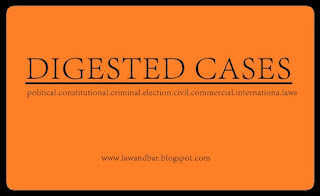Sermonia vs CA, et al, 233 SCRA 155
Criminal Case Digest
Digested Cases
Criminal Law
Facts: On 26 May 1992, petitioner Jose C. Sermonia was charged with bigamy
before the Regional Trial Court of Pasig, Br. 151, for contracting marriage
with Ma. Lourdes Unson on 15 February 1975 while his prior marriage to Virginia
C. Nievera remained valid and subsisting. Petitioner moved to quash the
information on the ground that his criminal liability for bigamy has been
extinguished by prescription.
In the order of 1 October 1992, respondent judge
denied the motion to quash. On 27 October 1992, he likewise denied the motion
to reconsider his order of denial.
Petitioner challenged the above orders before the
Court of Appeals through a petition for certiorari and prohibition. In the assailed
decision of
21 January 1993, his petition was dismissed for lack of merit.
21 January 1993, his petition was dismissed for lack of merit.
In this recourse, petitioner contends that his
criminal liability for bigamy has been obliterated by prescription. He avers
that since the second marriage contract was duly registered with the Office of
the Civil Registrar in 1975, such
fact of registration makes it a matter of public record and thus constitutes
notice to the whole world. The offended party therefore is considered to have
had constructive notice of the subsequent marriage as of 1975; hence,
prescription commenced to run on the day the marriage contract was registered.
For this reason, the corresponding information for bigamy should have been
filed on or before 1990 and not only in 1992.
Issue: WON there is an actual concealment of the bigamous marriage.
Held: The prosecution maintains that the prescriptive period does not begin
from the commission of the crime but from the time of discovery by complainant
which was in July 1991.
While we concede the point that the rule on
constructive notice in civil cases may be applied in criminal actions if the
factual and legal circumstances so warrant, 8 we agree with the view expounded
by the Court of Appeals that it cannot apply in the crime of bigamy
notwithstanding the possibility of its being more favorable to the accused.
Finally, petitioner would want us to believe that
there was no concealment at all because his marriage contract with Ms. Unson
was recorded in the Civil Registry which is open to all and sundry for
inspection. We cannot go along with his argument because why did he indicate in
the marriage contract that he was "single" thus obviously hiding his
true status as a married man? Or for that matter, why did he not simply tell
his first wife about the subsequent marriage in Marikina so that everything
would be out in the open. The answer is obvious: He knew that no priest or
minister would knowingly perform or authorize a bigamous marriage as this would
subject him to punishment under the Marriage Law. 10 Obviously, petitioner had no
intention of revealing his duplicity to his first spouse and gambled instead on
the probability that she or any third party would ever go to the local civil
registrar to inquire. In the meantime, through the simple expedience of having
the second marriage recorded in the local civil registry, he has set into
motion the running of the fifteen-year prescriptive period against the unwary
and the unsuspecting victim of his philandering.

